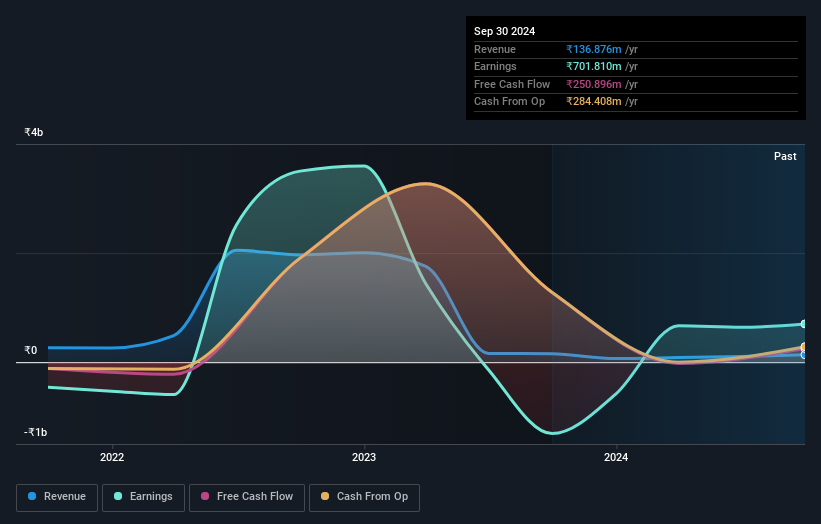- India
- /
- Real Estate
- /
- NSEI:PVP
PVP Ventures Limited's (NSE:PVP) largest shareholders are private companies who were rewarded as market cap surged ₹892m last week
Key Insights
- The considerable ownership by private companies in PVP Ventures indicates that they collectively have a greater say in management and business strategy
- The largest shareholder of the company is Platex Limited with a 51% stake
- Insiders have been selling lately
To get a sense of who is truly in control of PVP Ventures Limited (NSE:PVP), it is important to understand the ownership structure of the business. The group holding the most number of shares in the company, around 56% to be precise, is private companies. Put another way, the group faces the maximum upside potential (or downside risk).
As a result, private companies collectively scored the highest last week as the company hit ₹8.7b market cap following a 11% gain in the stock.
Let's delve deeper into each type of owner of PVP Ventures, beginning with the chart below.
View our latest analysis for PVP Ventures

What Does The Lack Of Institutional Ownership Tell Us About PVP Ventures?
We don't tend to see institutional investors holding stock of companies that are very risky, thinly traded, or very small. Though we do sometimes see large companies without institutions on the register, it's not particularly common.
There are multiple explanations for why institutions don't own a stock. The most common is that the company is too small relative to funds under management, so the institution does not bother to look closely at the company. It is also possible that fund managers don't own the stock because they aren't convinced it will perform well. Institutional investors may not find the historic growth of the business impressive, or there might be other factors at play. You can see the past revenue performance of PVP Ventures, for yourself, below.

PVP Ventures is not owned by hedge funds. Our data shows that Platex Limited is the largest shareholder with 51% of shares outstanding. This essentially means that they have extensive influence, if not outright control, over the future of the corporation. The second and third largest shareholders are PV Potluri Ventures Private Limited and Jhansi Sureddi, with an equal amount of shares to their name at 5.0%.
While studying institutional ownership for a company can add value to your research, it is also a good practice to research analyst recommendations to get a deeper understand of a stock's expected performance. Our information suggests that there isn't any analyst coverage of the stock, so it is probably little known.
Insider Ownership Of PVP Ventures
The definition of company insiders can be subjective and does vary between jurisdictions. Our data reflects individual insiders, capturing board members at the very least. Company management run the business, but the CEO will answer to the board, even if he or she is a member of it.
I generally consider insider ownership to be a good thing. However, on some occasions it makes it more difficult for other shareholders to hold the board accountable for decisions.
We can see that insiders own shares in PVP Ventures Limited. In their own names, insiders own ₹678m worth of stock in the ₹8.7b company. Some would say this shows alignment of interests between shareholders and the board, though we generally prefer to see bigger insider holdings. But it might be worth checking if those insiders have been selling.
General Public Ownership
The general public, who are usually individual investors, hold a 36% stake in PVP Ventures. While this size of ownership may not be enough to sway a policy decision in their favour, they can still make a collective impact on company policies.
Private Company Ownership
Our data indicates that Private Companies hold 56%, of the company's shares. It might be worth looking deeper into this. If related parties, such as insiders, have an interest in one of these private companies, that should be disclosed in the annual report. Private companies may also have a strategic interest in the company.
Next Steps:
It's always worth thinking about the different groups who own shares in a company. But to understand PVP Ventures better, we need to consider many other factors. Be aware that PVP Ventures is showing 4 warning signs in our investment analysis , and 1 of those is a bit concerning...
Of course, you might find a fantastic investment by looking elsewhere. So take a peek at this free list of interesting companies.
NB: Figures in this article are calculated using data from the last twelve months, which refer to the 12-month period ending on the last date of the month the financial statement is dated. This may not be consistent with full year annual report figures.
New: Manage All Your Stock Portfolios in One Place
We've created the ultimate portfolio companion for stock investors, and it's free.
• Connect an unlimited number of Portfolios and see your total in one currency
• Be alerted to new Warning Signs or Risks via email or mobile
• Track the Fair Value of your stocks
Have feedback on this article? Concerned about the content? Get in touch with us directly. Alternatively, email editorial-team (at) simplywallst.com.
This article by Simply Wall St is general in nature. We provide commentary based on historical data and analyst forecasts only using an unbiased methodology and our articles are not intended to be financial advice. It does not constitute a recommendation to buy or sell any stock, and does not take account of your objectives, or your financial situation. We aim to bring you long-term focused analysis driven by fundamental data. Note that our analysis may not factor in the latest price-sensitive company announcements or qualitative material. Simply Wall St has no position in any stocks mentioned.
About NSEI:PVP
PVP Ventures
Engages in the development of urban infrastructure in India.
Adequate balance sheet with low risk.
Market Insights
Community Narratives



